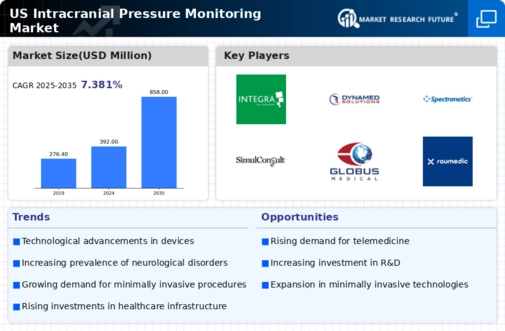Growing Investment in Neuroscience Research
Investment in neuroscience research is a critical driver for the intracranial pressure-monitoring market. As funding for neurological studies increases, there is a corresponding demand for advanced monitoring technologies that can facilitate research and clinical trials. This influx of investment is likely to spur innovation in the development of new devices and methodologies for intracranial pressure monitoring. Recent data indicates that funding for neuroscience research in the US has increased by approximately 10% annually, which may lead to breakthroughs in understanding and managing conditions related to intracranial pressure. Such advancements could significantly enhance the market landscape.
Rising Awareness of Traumatic Brain Injuries
The increasing awareness surrounding traumatic brain injuries (TBIs) is significantly impacting the intracranial pressure-monitoring market. As public knowledge about the consequences of TBIs grows, there is a heightened demand for effective monitoring solutions to manage these conditions. Healthcare professionals are increasingly recognizing the importance of early detection and intervention in preventing long-term complications associated with elevated intracranial pressure. This awareness is likely to drive market growth, with estimates suggesting that the market could expand by approximately 15% annually over the next five years. The focus on TBIs, particularly in sports and military contexts, underscores the need for reliable monitoring technologies.
Emerging Applications in Post-Surgical Monitoring
The intracranial pressure-monitoring market is witnessing emerging applications in post-surgical monitoring, particularly following neurosurgical procedures. As surgical techniques advance, the need for effective monitoring of intracranial pressure in the postoperative phase becomes increasingly critical. This necessity is driven by the potential for complications such as edema or hemorrhage, which can arise after surgery. Healthcare providers are recognizing the importance of continuous monitoring to ensure patient safety and optimize recovery outcomes. Market projections suggest that the segment focused on post-surgical monitoring could account for a substantial portion of the intracranial pressure-monitoring market, with growth rates expected to exceed 12% over the next few years.
Advancements in Telemedicine and Remote Monitoring
The rise of telemedicine and remote monitoring technologies is poised to transform the intracranial pressure-monitoring market. As healthcare systems increasingly adopt telehealth solutions, the ability to monitor patients' intracranial pressure remotely becomes more feasible. This trend is particularly relevant for patients in rural or underserved areas, where access to specialized care may be limited. The integration of remote monitoring devices into telehealth platforms could enhance patient management and reduce hospital readmission rates. Market analysts project that the telemedicine segment of the intracranial pressure-monitoring market may grow by over 20% in the coming years, driven by the need for efficient and accessible healthcare solutions.
Increasing Demand for Non-Invasive Monitoring Solutions
The intracranial pressure-monitoring market is experiencing a notable shift towards non-invasive monitoring solutions. This trend is driven by the growing preference for patient comfort and safety, as non-invasive methods reduce the risk of complications associated with invasive procedures. As healthcare providers seek to enhance patient outcomes, the demand for devices that can accurately monitor intracranial pressure without the need for surgical intervention is likely to rise. Market data indicates that non-invasive devices are projected to capture a significant share of the market, potentially reaching a valuation of $500 million by 2027. This shift not only reflects advancements in technology but also aligns with the broader trend of patient-centered care in the healthcare industry.




















Leave a Comment